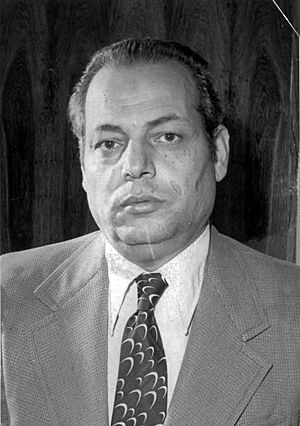Ali Akbar Moinfar facts for kids
Quick facts for kids
Ali Akbar Moinfar
|
|
|---|---|
 |
|
| Minister of Petroleum | |
| In office 29 September 1979 – 28 May 1980 |
|
| Prime Minister | Mehdi Bazargan |
| Preceded by | Office established |
| Succeeded by | Mohammad Javad Tondguyan |
| Minister without Portfolio for Plan and Budget | |
| In office 13 February 1979 – 29 September 1979 |
|
| Prime Minister | Mehdi Bazargan |
| Succeeded by | Ezzatollah Sahabi |
| Member of the Parliament of Iran | |
| In office 28 May 1980 – 28 May 1984 |
|
| Constituency | Tehran, Rey and Shemiranat |
| Majority | 1,439,360 (67.4%) |
| Personal details | |
| Born | 14 January 1928 Tehran, Pahlavi Iran |
| Died | 2 January 2018 (aged 89) Tehran, Iran |
| Political party | Freedom Movement of Iran (affiliate non-member) |
| Alma mater |
|
Ali Akbar Moinfar (Persian: علیاکبر معینفر; 14 January 1928 – 2 January 2018) was an important Iranian politician. He was the very first oil minister of the Islamic Republic of Iran, serving from 1979 to 1980. Later, he was a member of Iran's Parliament from 1980 to 1984, representing the Tehran area.
Early Life and Learning
Ali Akbar Moinfar was born in Tehran, Iran, on January 14, 1928. He studied hard and graduated from the University of Tehran in 1951. His degree was in structural engineering, which is about designing and building strong structures.
He continued his studies in Japan at Waseda University. There, he learned about seismic engineering. This field focuses on how to design buildings that can stand strong during earthquakes. He also helped start the Islamic Association of Engineers.
His Work and Roles
Moinfar worked for the plan and budget organization during the time of Mohammad Reza Pahlavi, who was the Shah (king) of Iran. He had connections with the Freedom Movement of Iran, a group led by Mehdi Bazargan. However, he was not officially a member of this movement.
After the Iranian Revolution in 1979, Moinfar became part of the Revolutionary Council. He also spoke for the council. He was chosen to be the minister of budget and planning in the temporary government led by Mehdi Bazargan.
In September 1979, Moinfar was given a new important job. He became the first-ever oil minister of Iran. This happened when the role of oil minister was created. He also became the head of the National Iranian Oil Company (NIOC).
Moinfar continued as oil minister even after the temporary government resigned in November 1979. He also won a seat in the Parliament in the 1980 elections. He faced some criticism during his time as minister. Moinfar supported certain leaders, like Abolhassan Banisadr, while in Parliament.
His time as oil minister ended in September 1980. After this, he continued to serve as a member of Parliament until 1984. In 1996, he tried to run for office again, but his application was not approved.
Later Years and Passing
Ali Akbar Moinfar stayed in Iran for most of his life. He only traveled outside Iran to visit his children who lived in other countries. He was also an honorary member of the European Association for Earthquake Engineering.
Moinfar passed away in Tehran on January 2, 2018. He was almost 90 years old.
 | Audre Lorde |
 | John Berry Meachum |
 | Ferdinand Lee Barnett |

